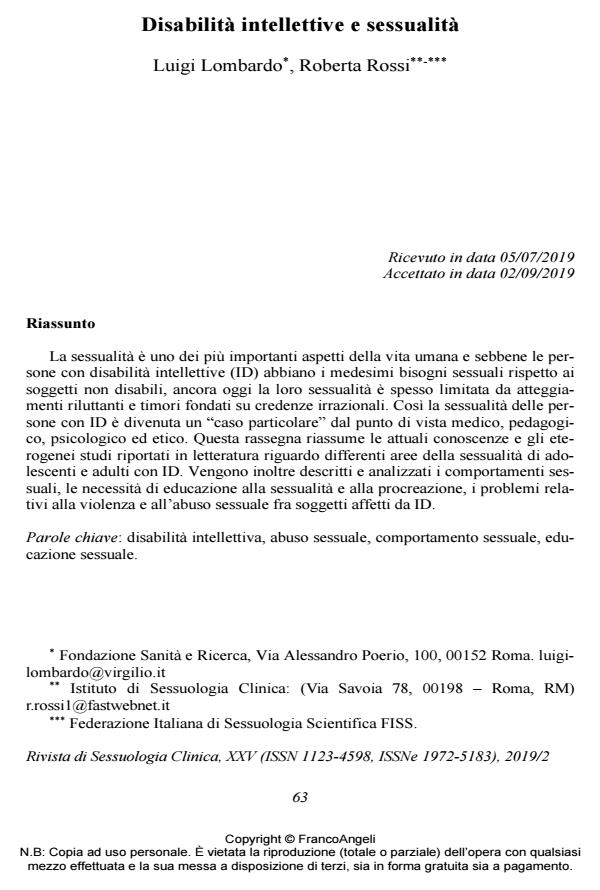Intellectual disabilities and sexuality
Journal title RIVISTA DI SESSUOLOGIA CLINICA
Author/s Luigi Lombardo, Roberta Rossi
Publishing Year 2019 Issue 2019/2
Language Italian Pages 18 P. 63-80 File size 260 KB
DOI 10.3280/RSC2019-002004
DOI is like a bar code for intellectual property: to have more infomation
click here
Below, you can see the article first page
If you want to buy this article in PDF format, you can do it, following the instructions to buy download credits

FrancoAngeli is member of Publishers International Linking Association, Inc (PILA), a not-for-profit association which run the CrossRef service enabling links to and from online scholarly content.
Sexuality in one of the most important aspects of human life, and although people with intellectual disability (ID) have the same sexual needs as those without any disability, yet their sexuality is often restricted by reluctant attitudes and fears based on irrational beliefs. therefore, the sexuality of people with ID is a "special case" both from medical, pedagogical, psychological and ethical point of view. This review summarizes current knowledge and the heterogeneous studies about different areas of sexuality in adolescents and adults with ID. The article is divided into four paragraphs. In the first paragraph, qualitative studies are examined, in which it is described how people with ID face attitudinal and service barriers when attempting to form intimate relationships, while positive interpersonal relationships are beneficial, acting as a protective factor against social stigma and negative out-comes such as physical and mental health problems. The research findings demonstrate how poorly integrated people with ID disabilities are within main-stream society and raise questions about how best to support these people with sexuality and intimate relationships, increasing awareness of their sexual rights, of the importance of physical contact in the close relationships, and also their self-efficacy perceptions and performance of safer sex practices to prevent negative sexual consequences, promoting positive support arrangements. In the second paragraph, quantitative studies are analysed, investigating sexual activity and sexual health amongst people with ID. Although sexuality plays a major role in the socialization of people, few studies have examined the sexual behaviours of indi-viduals with developmental disabilities. The results of the most important studies underline that, on the whole, behavioural and sexual problems are more common in people with ID than in normal people. Moreover, most young people with ID have sex and are more likely to have unsafe sex than their peers. However, the phenomenon of sexuality of people with a higher degree of intellectual disability is an issue that needs further constant analysis. The research has also made it possible to detect what kind of sexual behaviour people with ID undertake and the val-ue of sexuality for such people. The results obtained emphasize the need to draw up educational programmes, differentiated according to gender and adapted to their reality, which include contents related with sexual health, sexual abuse and condom use, and to develop culturally sensitive interventions to improve knowledge and awareness of sexual needs. The third paragraph explores how lesbian, gay, bisexual and trans (LGBT) people labelled with ID experienced their sexual identities. There are few recent studies and available findings are often contradictory and inconsistent. Often people who are LGBT face a whole range of rights violation when it comes to exercising their sexual identity and can face many challenges in society including accessing education, care and support ap-propriate to individual needs. Specific problems impact the lives of homosexual people with ID, namely the high prevalence of negative sexual experiences, the lack of support, training and sex education, and their search for a suitable partner. Therefore, there is a need for service providers and carers to be more responsive to the concerns of people with ID who identify as LGBT to improve their health and well-being by reducing stigma and discrimination and by increasing awareness of their care and support needs. The fourth paragraph provides a review about the inappropriate sexual behaviour (ISB) and the sexual abuse literature relevant to individuals with an ID. The incidence of ISB among the intellectually disabled is 15-33%, however, the nature tends to be more socially inappropriate than with violence intent, so many sex offenders commit other offenses such as vandalism or assault. The prevalence of sexual abuse is 6.10% when it is self-reported and 28.6% when is reported by professionals, and the findings confirmed that children and adults with an ID are at a higher risk of sexual abuse than non-disabled peers. People who self-reported cases of abuse present poorer quality of life, more nega-tive attitudes towards sex and a lower capacity to identify situations that entail a risk of sexual abuse. On the whole, these findings highlight the need to tackle the barriers to sexual knowledge faced by people with ID, and the need to take account of the broader social context of their lives when doing so. Providing sex and relationship education ID people would help them achieve a fulfilling and reward-ing sexual experience and make them less vulnerable to sexual abuse.
Keywords: Intellectual disability, sexual abuse, sexual behavior, sex education.
Luigi Lombardo, Roberta Rossi, Disabilità intellettive e sessualità in "RIVISTA DI SESSUOLOGIA CLINICA" 2/2019, pp 63-80, DOI: 10.3280/RSC2019-002004